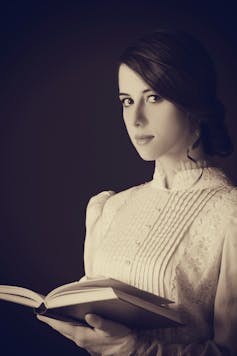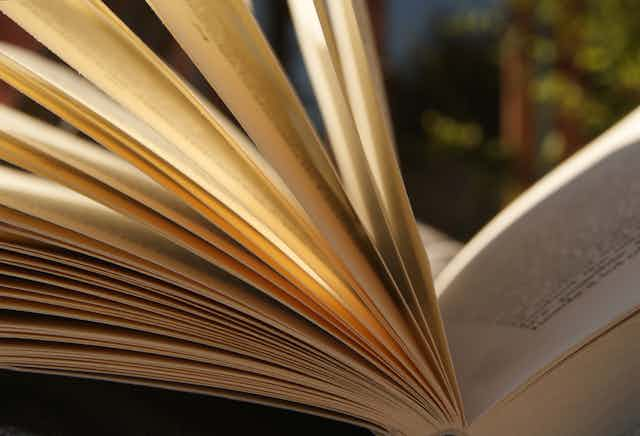Whether snuggled up at home or out partying with family and friends, the dawn of the new year is something to toast to. But not so long ago, the people of Britain were commemorating the start of the forthcoming 12 months in a very different way – with books.
In the early 20th century, Edwardian Britain was gripped by a reading craze. On the playground at school, on a tea break down the mines, or in the drawing room of a mansion, men, women and children of all classes and ages were rarely without a book.
The idea of giving a book as a gift became popularised in the Victorian era. Books were bought for others to celebrate birthdays, weddings, anniversaries and, of course, Christmas. In fact, by the end of the 19th century, books had come to be so expected at Christmas that one Times reporter claimed that “Christmas would not be recognised without them”.
Books at Christmas is not something unique to British culture. Icelanders have long given books to each other on Christmas Eve and stayed up all night reading them. The custom is so deeply ingrained in Icelandic culture that it causes an annual jólabókaflóðið (“Christmas book flood”), as countless copies of around 700 volumes are published in just over four months. But it is the way that Edwardian Britons used these books that is quite unusual.
As mass consumerism and the formation of a commodity culture grew, the Victorian practice gradually spread to the new year. By 1901, no Edwardian stepped into the new year without a book. But the reason of this was not down to a tradition of gift-giving, it was guided by superstition. The Edwardians believed that bad luck would fall upon any family who did not have a book in hand when the clock struck midnight on December 31.
Predicting the future
Books were said to foretell a family’s fortune for the year. So, on New Year’s Day, families would gather around the fireplace and practice bibliomancy. This involved opening the new book on a random page and reading the passage to predict what would happen in the coming year.
Bibliomancy (from biblio meaning “books” and mancy, “divination by means of”) has a long spiritual tradition. Its origins lie in the Ancient Roman sortes, which involved using the texts of Homer and Virgil to predict the future (The Use of Sacred Books in the Ancient World, Leonard Victor Rutgers). Although the Bible explicitly condemns divination, it was widely adopted throughout the Middle Ages as a “magical medicine” that removed negative forces. In popular culture, bibliomancy occurs frequently throughout works of fiction, from Jules Verne’s Michael Strogoff to Philip K. Dick’s The Man in the High Castle.

If Edwardians had been unfortunate enough not to receive a new book on New Year’s Eve, the Bible was chosen. A family member (typically the father) would ask a question, open the Bible at random, close his eyes and circle the text with his finger. When the “spirit” told him to stop, he would open his eyes and read the “answer” wherever his finger landed.
Increased secularity meant that in the absence of a new book or the Bible, much-loved classics like Charles Kingsley’s novel Westward Ho!, Robinson Crusoe by Daniel Defoe, and Pilgrim’s Progress by John Bunyan could all be used to “predict” the future.
In Wilkie Collins’ The Moonstone, bibliomancy is routinely practised by the protagonist Gabriel Betteredge using the pages of Robinson Crusoe.
When my spirits are bad – Robinson Crusoe. When I want advice – Robinson Crusoe. In past times when my wife plagued me; in present times when I have had a drop too much – Robinson Crusoe. I have worn out six stout Robinson Crusoes with hard work in my service.
Although Collins was sending up this popular fad, bibliomancy was an important part of Victorian and Edwardian book culture. It was used by eminent figures including poet Robert Browning, who took to bibliomancy to find out about the fate of his attraction to fellow poet, and his later wife, Elizabeth Barrett. Though he made the unusual choice of Cerutti’s Italian Grammar for the divination, upon randomly opening it his eyes fell on the sentence: “If we love in the other world as we do in this, I shall love thee to eternity.”
Sadly, bibliomancy did not always make for happy endings: some were led to commit crimes and others were even known to have killed themselves over the result of a reading. On April 2 1866 The Belfast Morning News reported the story of a man who stole a set of spoons from a house because he believed that the Bible had told him to do so. He was, consequently, fined and sentenced to hard labour.
Toady bibliomancy is only practised by a few, but if you find yourself at a loss this New Year’s Eve, grab a book from the shelf. Whether it comes true or not, the text you find could inspire a positive outlook for the year ahead.

